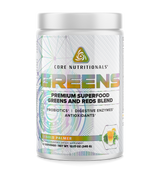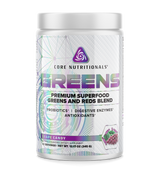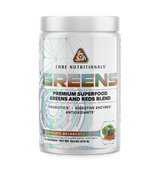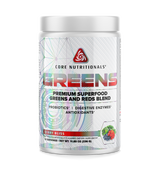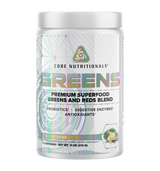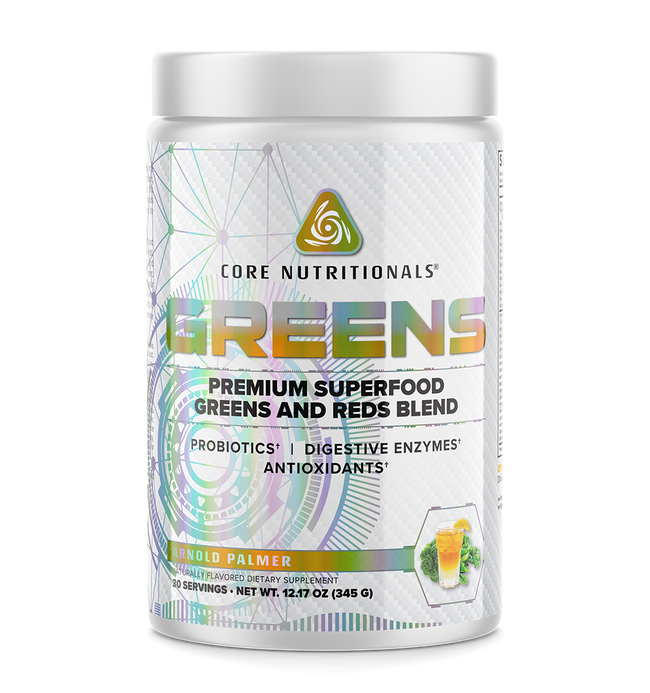
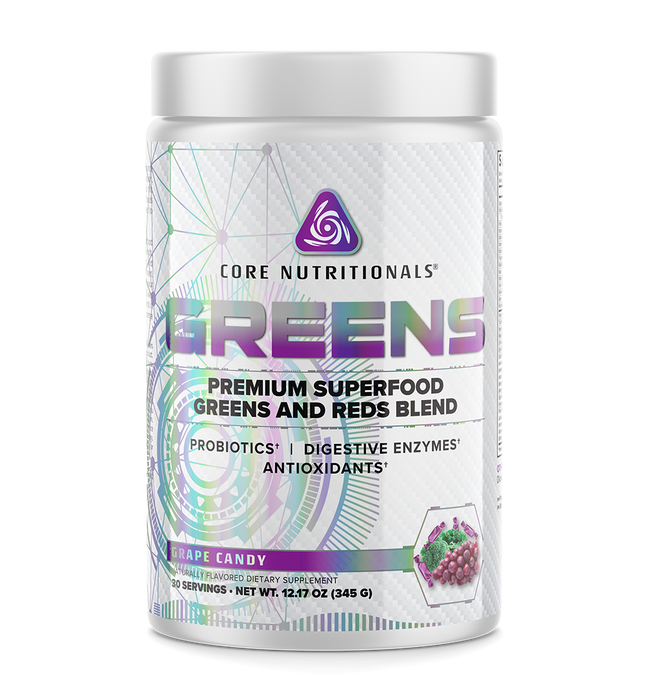

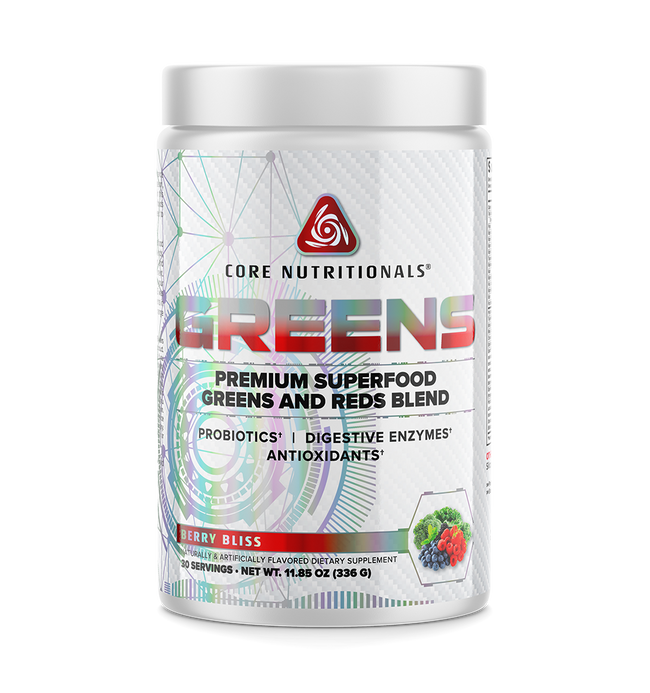

From a very early age, we all learned about the importance of eating your fruits and vegetables. For some reason, whether it is a taste issue or lack of convenience, in this day and age many people are lacking these precious foods in their diets. With Core GREENS you no longer need to miss out.
With its comprehensive "greens" (and "reds") superfood formula, added probiotic and digestive enzyme blends, and delicious taste, Core GREENS is a convenient and systematic general health and wellness supplement. Providing critical micronutrients and antioxidants that your body needs in a single delicious scoop, Core GREENS was formulated for maximum health benefits.Key ingredients in Core GREENS have been shown to improve a wide range of crucial health measures.
Maintaining optimal health has never been more difficult. Demanding work schedules leave little time for preparing a diet full of the micronutrient-dense foods our bodies require, leaving us scrambling for patchwork solutions. Though we can supplement our diet with a range of solutions, most are too narrow in focus, cause bloating and gas due to lacking digestive enzymes, or are cost prohibitive. Core GREENS attempts to break that mold, providing a whole-food solution to ensure that you can meet your recommended daily intake of not only valuable vitamins and minerals – but also optimize your diet with probiotics, digestive enzymes, and potent anti-oxidants.
The heart of our GREENS formula is our plant blend, constituted by: Psyllium husk, TruServ® (organc kale, broccoli, and spinach), barley grass, wheat grass, chlorella, spirulina and Spectra™. Our 11+ gram scoop provides the function equivalent of several pounds of these greens. Additionally, one scoop serving delivers you 100% of the daily value of 13 vitamins and a range of antioxidants and bioactives. To complement the greens themselves, we have added TruServ® and Spectra™ two industry-leading plant and vegetable/fruit blends. And lastly, to ensure that GREENS does not cause the bloating and gas associated with many greens products, we have included not only probiotics, but a full-spectrum digestive enzyme blend. Were that not enough, the product tastes fantastic!
Now more than ever, your optimal health is too important to leave to chance. Core GREENS is the most convenient and easiest way to deliver to your body the vitamins, minerals, bioactives and antioxidants it requires to function optimally.
TruServ®:
The TruServ® program is a customizable whole food powder solution by Core Nutritionals’ key partner, Futureceuticals. Core Nutritionals included Futureceuticals’ greens blend, which includes 14 kale leaves, four spinach leaves, and one broccoli floret in each 2g powder serving.
The benefit of the TruServ program is the verification process. The TruServ Verified® process is FutureCeuticals’ exclusive method of substantiation that connects their extensive production data and the USDA Nutritional database to only our fruit, vegetable and leafy green ingredients. The result is a greens blend verified and substantiated by the USDA itself – giving you additional piece of mind. Each TruServ® blend is organic, fully disclosed, and comes from a dependable and sustainable supply chain.
Spectra™:
Spectra™ is the first scientifically validated formula of fruits, vegetables, and herbs shown to inhibit free radical production, optimize cellular metabolic activity, and increase nitric oxide levels within our bodies


Spectra™ represents the latest evolution in the fight against potentially-damaging free radicals. For the first time anywhere, the biological effects of a natural supplement on the changes of oxidative and nitrosative stress markers, as well as cellular metabolic activity, have been clinically observed in the human body. Spectra™ has been reported to decrease ROS, increase cellular oxygen consumption in blood and mitochondria, decrease extracellular H2O2, and reduce TNFα-induced inflammatory response in humans.
Psyllium Husk 85% (husk):
Most of the literature on the beneficial health outcomes of fiber consumption comes from population-level epidemiological studies relying on self-reported fiber intake levels. Problematically, these epidemiological studies often fail to control for residual confounds, making the physiological benefits of fiber less clear.
Luckily, recent evidence in well-controlled, long-term trials using natural fiber supplements such as psyllium husk are beginning to elucidate the benefits of fiber supplementation. Those trials demonstrate that the physical effects of fiber in the small intestine drive metabolic health effects (lowering cholesterol and improving glycemic control); while in the large intestine, fiber can provide a laxative effect. As to the effects in the small intestine, a small trial on cereals, in 345 subjects, showed that the cereals highest in viscosity – psyllium husk is extremely high viscosity – lowered LDL cholesterol by 45% on average.
Chlorella and Spirulina Powder:
Chlorella and spirulina are the organisms behind the most common forms of green and blue/green algae, respectively. Chlorella has been variously classified as either a plant or a protist, while spirulina is a kind of cyanobacteria and thus classified as a bacteria. Regardless of the taxonomical differences between chlorella and spirulina, emerging evidence suggests that both have a range of benefits for human health.
The first benefit is that the macronutrient constituents in the plants themselves are favorable. Spirulina is a source of high-quality protein, γ-linolenic acid, and phycocyanin content. Chlorella, in turn, contains a variety of bioactives, including nucleic acids, amino acids, vitamins, minerals, polysaccharides, glycoproteins, and β-glucans.
In addition to their macronutrient content, both chlorella and spirulina contain bioactive compounds that emerging evidence suggests have potential health effects. Polypeptide chains isolated from chlorella, for example, were shown in in vitro and animal models to be potent ACE inhibitors. ACE (angiotensin converting enzyme) is an enzyme that catalyzes the conversion of inactive Angiotensin I (AG-I) to the active Angiotensin II (AG-II). In turn, AG-II binds to the Angiotensin II receptor in smooth muscle and elicits the production of aldosterone – creating a hypertensive effect through direct and indirect means. While still preliminary, evidence suggests that the isolated polypeptides in chlorella may be ACE inhibitors.
Similar trials on the reduction of HbA1C, for example, demonstrate that these microalgae and their constituent parts may indeed be superfoods.
Digestive enzyme blend:
One can easily make the argument that dietary enzymes – and in particular, digestive enzymes – are the most consistently underrated and overlooked component to a supplementation regimen. These powerful little protein structures influence or outright control a vast, complex network of bodily functions. In a fitness-specific context, digestive enzymes play an absolutely crucial role in the breaking down of dietary carbohydrates, fats, and proteins into their constitutive parts, and therefore allow your body to use them in various processes (glycogenesis, protein synthesis, etc).
Despite their critical function, many supplement companies overlook the necessity of digestive enzymes and do not include sufficient levels (and kinds) of enzymes in their products.
As usual, we take a much more comprehensive, clinical approach than the average. In Core GREENS, we have included a digestive enzyme blend comprised by amylases, proteases, lactases, amylases, and cellulases, allowing for a full and complete breakdown of all GREENS’ components.
Probiotic blend:
Under normal conditions, our gut microbiota – the constellation of intestinal flora that play innumerable physiological roles – are balanced between “good” and “bad” bacteria. The good bacteria confer immunity to us from pathogens, improve digestion of food, help regulate mood and more – while the “bad” bacteria cause a range of pathological conditions, invite pathogens, and generally wreak havoc on our bodies. The point of a well-designed probiotic is maintaining this intestinal balance in the “good” direction.
Using a probiotic supplement helps offset the microbiotic impact of stressors such as illness, medications (antibiotics), hormonal variations, and an incomplete diet. While the evidence is still emerging, the potential health benefits of probiotics have been seen in many conditions.
Vitamin A (as Beta Carotene)
Beta carotene is itself not an essential vitamin but is rather the precursor to the fat-soluble and essential vitamin, vitamin A (Retinol). Like B vitamins, the term vitamin A refers to the compound class retinoids, comprised of retinol, retinal (also called retinaldehyde), retinoic acid, and provitamin A compounds such as beta carotene.
As their names suggest, retinoids are critical to the function of human eyes and therefore to the maintenance of circadian rhythms (our “biological clock”). Vitamin A combines with proteins in the eye to form light-sensing cells that both facilitate vision and regulate our sleep-wake cycles.
Beyond its role in sight, vitamin A is also essential for cellular growth and differentiation and the immune system.
Vitamin C (as Ascorbic Acid)
Vitamin C is perhaps historically best-known for the treatment and prevention of scurvy, though it has many other roles in the body. For example, vitamin C catalyzes or is a cofactor in eight enzymatic reactions involved in the synthesis of collagen, the nutrient carnitine, and several neurotransmitters necessary for the proper function of the brain.
In the contemporary context, vitamin C is best known as a potent antioxidant. In addition to its intrinsic activity as an antioxidant, vitamin C has been shown in in vitro trials to regenerate alpha-tocopherol (vitamin E). As an antioxidant, vitamin C combats the detrimental effects of a group of compounds called radical oxygen species that, when produced, degrade the lipid membrane of the cell and may cause internal damage. By “scavenging” these free radicals, vitamin C and other antioxidants form a defense against excess cellular damage.
Vitamin D3 (as Cholecalciferol)
Vitamin D, in its various forms, is not an essential nutrient – as it is produced endogenously within the body, as a reaction to the skin’s exposure to the sun – and thus not commonly considered a vitamin. Despite its technical classification, vitamin D (a hormone), is nevertheless an import and biologically-active compound, necessary for the calcium homeostasis and metabolism, along with increasing the absorption of magnesium and phosphate.
Vitamin E (as Mixed Tocopherols)
Vitamin E is another technical misnomer, as the term refers to a group of compounds known as tocopherols with eight biologically-active constituents: alpha-, beta-, gamma-, and delta-tocopherol and alpha-, beta-, gamma-, and delta-tocotrienol. Alpha-tocopherol is the principal bioactive in humans, though the presence of other tocopherols has been linked to beneficial effects.
As a result of its robust antioxidant activity, vitamin E assists in the maintenance and support of several physiological processes, though most notably sight and the immune system. Emerging research also suggests that the alpha-tocopherol form of vitamin E inhibits an enzyme known as protein kinase C, and therefore contributes to the healthy regulation of smooth muscle cell growth and differentiation.
Critically, we have used the natural version of vitamin E (technically d-alpha tocopherol) and not the synthetic (dl-alpha tocopherol). The difference is a meaningful one: the single isomer of d-alpha tocopherol is easier and more efficiently absorbed and used in the body as compared to the eight isomers in the dl analog.
B Vitamins (Thiamine, Riboflavin, Niacin, B6 [Pyridoxine], Folic Acid, B12, Biotin, and Pantothenic acid)
B vitamins are a group of eight essential vitamins with several critical functions in the body. Though both molecularly and physiologically distinct, they are also deeply interrelated in their effects, synthesis and metabolism. Among the B-complex’s many critical roles are energy (protein, carbohydrates, and fat) metabolism, supporting and maintaining the healthy function of the adrenal glands, skeletal muscle function, and digestion.
While rates of metabolism and clearance differ between each B vitamin, all B vitamins are water-soluble and are thus not stored in fat. As a result, the body simply excretes excess B vitamins in the urine and requires replenishment (from food or supplements) in order to maintain the cell functions to which B vitamins contribute.



